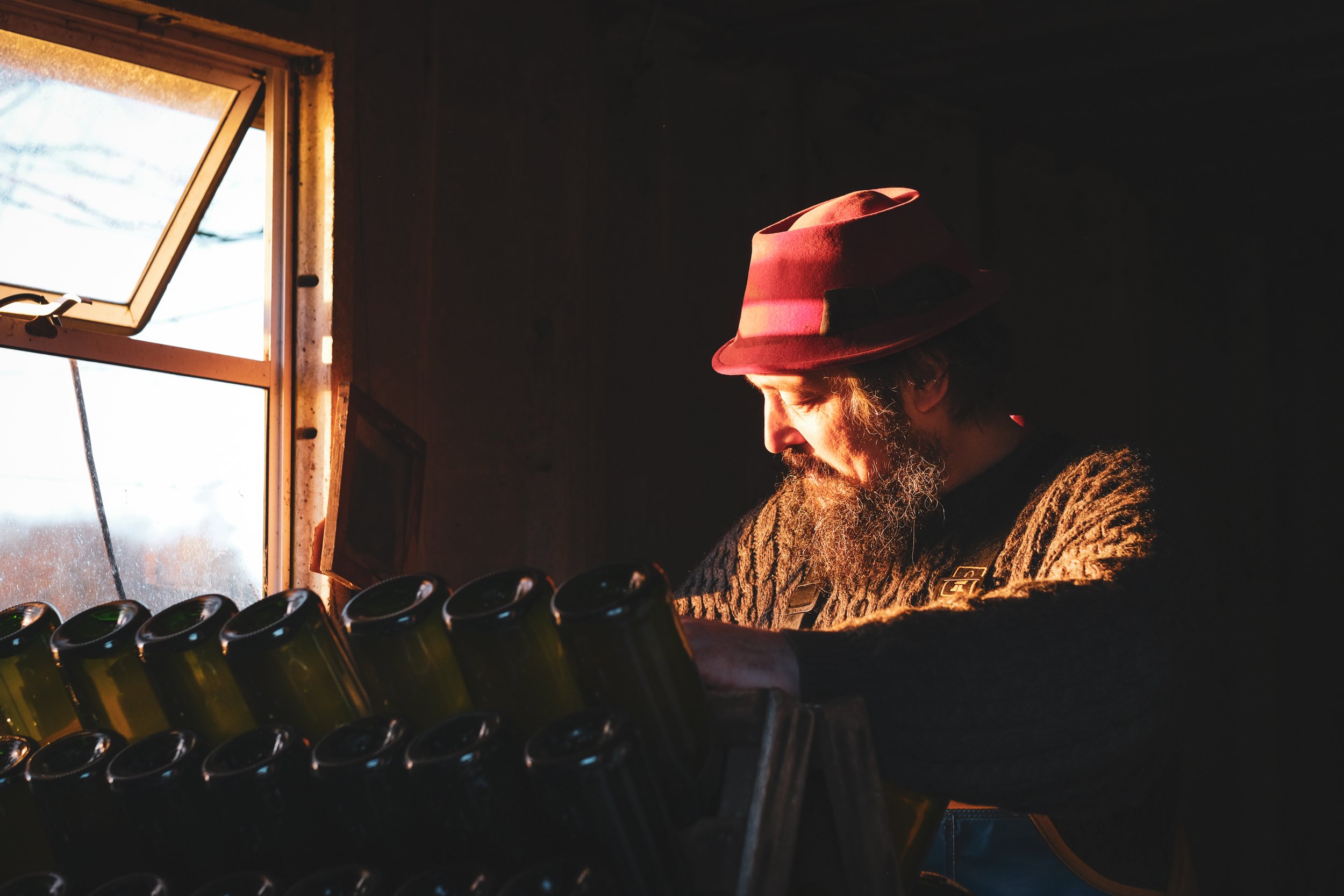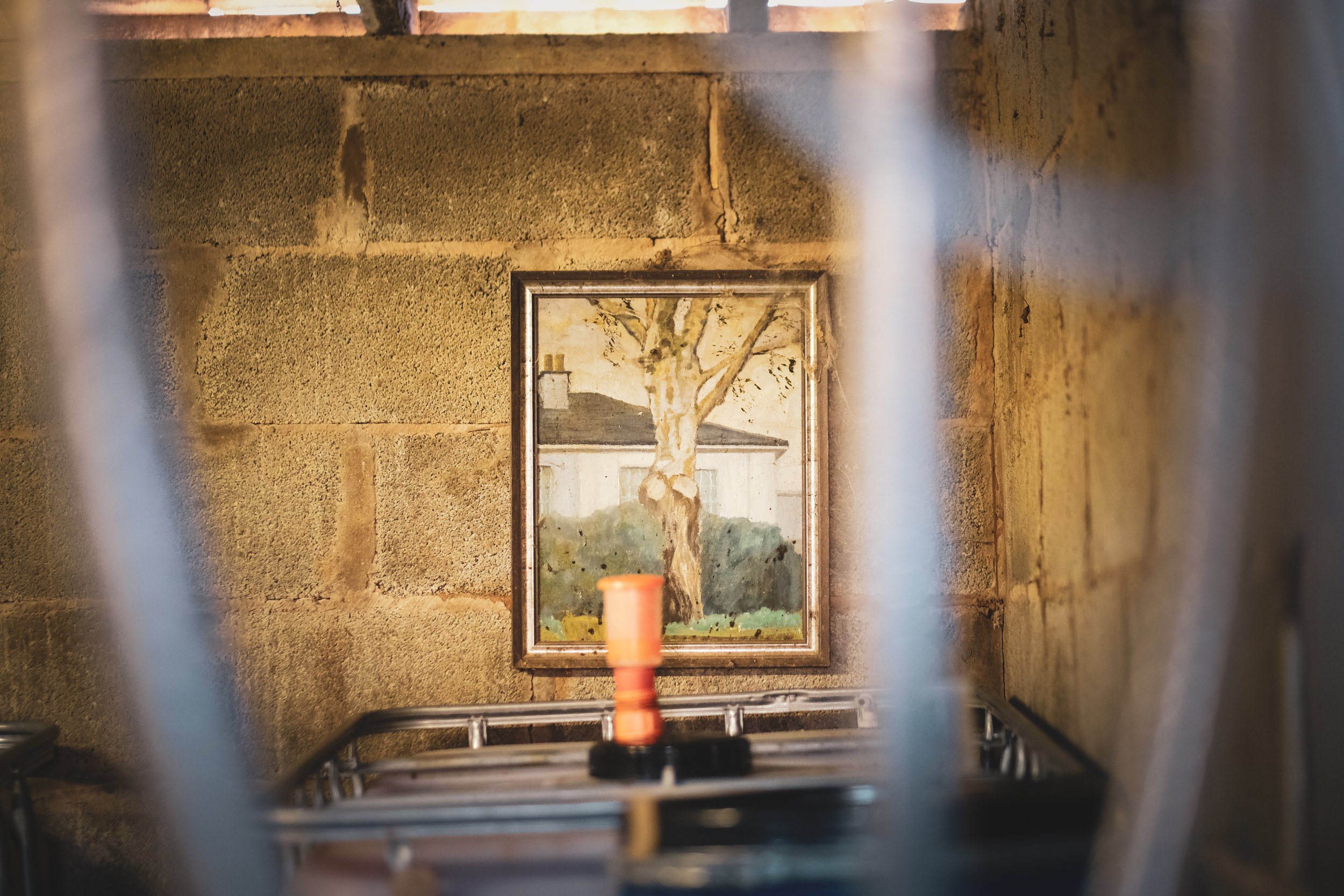Turn, Turn, Turn — Herefordshire’s Artistraw Cider and The Circle Unbroken
Pagan and Celtic traditions have for a long time captivated Lydia Crimp and Tom Tibbits of Herefordshire’s Artistraw Cider. They’ve even started marking each season with their own series of ciders called ‘The Circle Unbroken’ to celebrate this.
Photography by Lily Waite
Lydia tells me how she’d been toying with the idea that taste and flavour remind us of certain things—like music—and exploring how taste can mimic the seasons, and remind you of certain points in time. This is bound with the couple’s own interest in folk culture, and their deep connection to the land they live on, perched high on a hill above Hay-on-Wye, on the borderlands of the Welsh Marches.
“The Celts always celebrated the passing of the seasons,” Lydia says. “It feels like a crucial part of life, a never-ending cycle.”
Their plan for this series is to bring out four ciders across the year: Beltane, Lammas, Samhain, and Imbolc—each taking its name from the festival celebrating the particular season. The range aims to evoke the feeling of the season rather than being a recipe they might later repeat, as they work with wild yeasts native to the fruit, and in many cases, biennial orchards, with batch sizes varying from 300 to 1000 bottles.
Observing that some apples lend themselves better to certain seasons, they reckon the bright acidity of dessert fruit works well with the freshness of Spring in Beltane—which boasts the Yarlington Mill, Reinette D’Obray, Chisel Jersey, Browns, and Kingston Black cider apple varieties. Whereas Knotted Kernel (with a dash of Kingston Black, Lambrook Pippin and Foxwhelp) has “cherry brandy” notes conjuring up images of roaring fires for their wintry, Hallowe’en release, Samhain (pronounced SAH-win.) Lammas marks the end of Summer and boasts Dabinett, Browns, Yarlington Mill, and a little Strawberry Norman. Imbolc is all about renewal and promise, with Major, Bisquet, Brown Snout, Chisel Jersey, and Ellis Bitter.
They pair Beltane with fresh asparagus and local goat’s cheese, Dorstone, and I sipped mine with some gorgeous Sinodun Hill cheese and simple salad leaves. Lammas has a more tannic feel and goes with what the couple grow in their organic garden, including courgette flowers and Padrón peppers. Samhain instantly felt more robust to me, pairing well with truffle-flavoured salami. I can’t wait to see what might complement their first Imbolc release, which will be released in February 2023.
Their admirers include Little Pomona’s Susanna Forbes, who reckons Artistraw’s approach is as important as their cider, placing the environment first, middle and last.
“[They’re doing] everything from planting their own trees, growing their own food, through to working out the carbon footprint of their ciders,” Susanna tells me. “Along the way you have beautifully textured, full juice ciders, and captivating labels that tell a story.”
There’s an alchemy about Artistraw. Tom is science. Lydia is art. Quite literally. Lydia laughs: “I’m not quite sure how we ended up with a cider business!”
Tom is a trained physicist who worked in California, developing “quantum well solar cell technology,” now deployed in space on satellite stations, and spent his weekends exploring the craft beer revolution there. He soon realised this scene would spread as a global trend. Having initially thought he’d get into brewing, he instead picked up where he’d left off as a lad and opted to use his cidermaking skills.
Lydia is a theatrical costume maker and supervisor who studied fashion design and worked at Shakespeare's Globe, and memorably at the National Theatre. She’s worked with Cate Blanchett, Nicola Walker, Phil Daniels and, early on, for Katie Price.
“I’d be up at four in the morning, sticking crystals onto leotards for her to wear for her book launches,” Lydia tells me.
The couple met at a swing dance lesson in May 2010, and married in 2015. Tom’s head had already been turned by “soft, luscious, naturally sweet, keeved" Breton cider. In turn, he got Lydia hooked on a trip to Normandy, visiting Adam and Ann Bland of Templar’s Cider, in Pays d'Auge. Their own ciders deliberately have a similar quality.
They talked of moving out of London, getting some land, and starting a business. Then fate intervened when Tom’s cousin Sarah asked if they wanted to rent her chocolate box, black-and-white, listed cottage in Knighton for a while, to see if they liked living in Herefordshire. Lydia was immediately hooked.
““The Celts always celebrated the passing of the seasons. It feels like a crucial part of life, a never-ending cycle.” ”
“The floorboards had knots that had popped out so you could stick your finger through them,” she says. “It was the most tumbledown cottage ever, but very beautiful, covered in wisteria, with amazing wildlife. I was sitting on a bench the first week, and a buzzard came and landed on the seat next to me.”
By late 2018, they’d bought and moved into their own home, near the market town of Hay-on-Wye. Lydia still remembers coming over the hill to view the place. ”It literally had my heart before we even arrived. I was convinced I couldn’t be anywhere else.”
Arriving during harvest, they had to hit the ground running. It was stressful, but they had the perfect plot for apples and growing all their own organic produce, and now feel rooted to this spot.
“In the same way we love traditional, standard orchards and old trees, the provenance of our food is important; it’s all linked,” Lydia says.
They started producing ciders and perries—many featuring a shrew in Lydia’s label designs and in their punning names, for example, 'Dark Side of the Shrew’ and ‘Water Shrew Sunset’, after stumbling across the ancient, local name for the shrew, ‘Artistraw’.
Then, just as they were getting going, the pandemic changed and accelerated their plans. Lydia’s theatre work dried up overnight, so she took charge of cidermaking, while Tom did his solar consultancy work from home.
“I never thought I’d be making cider as well,” Lydia says. “I was going to do the branding and was happy to do that. As time’s gone on, the more I’ve read into cider history and provenance and apples—and all I drink now is cider, pretty much.
***
“[We want to] get ourselves away from the disposable, consumptive culture of debt and infinite growth we have at the moment, and back towards mimicking natural regenerative cycles and developing resilience to the coming climate challenges,” Tom tells me.
Tom wants the seasonal rhythm of cidermaking, and of Artistraw’s entire natural existence, to resonate through The Circle Unbroken series. He also hopes they’ll develop a following for high-quality, domestically produced cider, and will encourage others to bring neglected orchards and small farm orcharding back into the regenerative agricultural systems of the future.
“Much is talked about the ‘circular economy’ these days,” he says, “and we want to play our part in making that a reality in our business.”
Picking up on the idea of cycles and circles, Lydia wants the series to act as a vehicle to provoke more conversation into the circular seasonality of the apple—from pollination through to harvest and selecting the fruit that will go into their cider, and also pruning and grafting in the first months of the year.
“For too long there has been a disconnect between the land and the finished drink. With the re-emergence of the small-scale cider scene, and the restored focus on the apples, orchards and amazing varied flavours these can create,” she tells me. “We have a real opportunity to elevate cider back up to its rightful place among the finest of wines.”
““We want to get ourselves away from the disposable, consumptive culture of debt and infinite growth.””
One of the things that reinforce the story of circularity is Lydia’s distinctive artwork on each label in the series—which they named after the century-old, Carter Family folk song ‘Will The Circle Be Unbroken’, about the continuing cycle of life, even beyond death. She’s making it into an ongoing narrative, with all the labels stitching together to create a sort of Bayeux Tapestry of seasonal images. Every time there’s a new cider in the series—with potentially even more in future years—this image will grow, with each label design featuring a tiny, overlapping segment of the previous release, so the design should flow into one long image.
Artistraw fan Tom Oliver isn’t swayed by labels, though. For him the mouthfeel and aftertaste of their ciders speak volumes, and he’s one of several fellow makers looking forward to watching their progress.
“When it comes to cider, I just like to drink it, and maybe talk about it! Artistraw are a case in point,” He says. “[Theirs is] cider clearly made in a Herefordshire fashion with locally grown apples to the fore and all the wonderful character that yields. The fullness and depth of taste, on occasion the use of residual sugars for fruit and sweetness.”
Lydia still does occasional freelance illustration work, while becoming progressively hooked on everything involved in orcharding. Along with Elizabeth Pimblett from Hereford Cider Museum, she was an original founder of Cider Women—a group formed in 2019 to “help facilitate peer support and networking for women, non-binary, and trans people involved in cider in the UK.”
Tom works with Friends of the Upper Wye, monitoring river water quality to find pollution sources and clean them up. Plus he’s Treasurer for Three Counties Cider and Perry Association, lobbying politicians on cider duty, definitions, and small cidermakers’ relief.
One of their bugbears—like many small-scale cidermakers—is being stymied by current duty regulations. They never want to become a “cider factory,” Lydia says, as “total control over fruit quality and the ability to work by hand in beautiful, old, biodiversity-rich orchards is integral to what Artistraw is.” But they’d love to be able to make use of all of the fruit available to them in good years.
Artistraw’s ambition continues apace, as they tend their permaculture and forest garden, grow all their veg organically, and look for ways to increase their self-sufficiency, from creating rainwater-harvesting systems to saving and sharing seeds.
Tom is excited about their future, but with a note of caution. “Artistraw has evolved in ways I couldn't have imagined five years ago. We are lucky to have access to land in the UK that we can use to support and enhance our lives, but I worry as climate change intensifies how it will impact orchards and agriculture generally. The picture is one of hope and optimism, tempered by trepidation.”








































